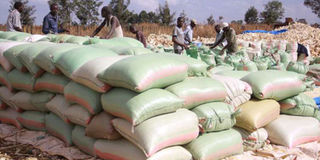Maize dispute: Why too much noise, very little action will be our undoing

Labourers pack maize seeds into sacks at a farm in Kabobo village, Uasin Gishu, on December 31, 2016. The government may import maize to assuage hunger effects. PHOTO | FILE | NATION MEDIA GROUP
What you need to know:
- There will just be enough maize to get us through August, especially if imports from Tanzania are allowed to continue.
- A majority of Kenyans who rely on surplus production or imports will have little or no supply from September to November unless we import maize.
The Agriculture Committee of the National Assembly is largely correct in its analysis of the current maize situation, but incorrect in its overall take and conclusion.
Yes, there will just be enough maize to get us through August, especially if imports from Tanzania are allowed to continue. Where the committee goes wrong is in its conclusion that maize harvests from September onwards will see us through to the next main surplus crop in December.
The flaw in their argument is that the maize, which is to be harvested shortly, will be a surplus to local requirements and so will help feed the rest of the country. That is largely a false assumption.
Much of the country, particularly urban areas and the extensive non-producing areas, rely on the surplus crop that comes from our grain basket of the North Rift — Trans Nzoia and Uasin Gishu.
DIFFICULT JOURNEY
That crop is having a chequered and difficult journey. First, the late onset of the rains resulted in much of the early crop being blighted. The additional sowing that took place will result in a crop that will be harvested from November onwards.
In the cold and un-emotive light of day, the overall picture is that while some areas in Central, South Rift and Western will have crops that may satisfy local demand, they will not supply the country’s overall needs.
Let us be clear about that overall position regarding maize production and demand in Kenya. We consume in excess of 44 million bags per year, but on average we produce around 33 million bags. This structural deficit is often made up by imports from Uganda and Tanzania.
In a reasonable year, we get by, but when we have adverse weather conditions like we had earlier in the year we need to import like we did in 2017.
Fast-forward to today. A majority of Kenyans who rely on surplus production or imports will have little or no supply from September to November unless we import maize.
In addition, prices rise or decline depending on the market. When the market perceives there is a surplus, prices tend to decline. When there is a shortage or a perception of one coming, the prices move upwards.
MAIZE PRICES
The latter is what is starting to take place now. The way one tackles that is to rectify the demand versus supply difference as soon as possible.
The longer we hum and haw and argue about whether we need imports or not the more we are increasing maize prices and making life more difficult for most of our population.
From a cynical point of view, the former is in the interests of those who have stocks as they are sitting on the best short-term investment in the country. But it is not in the interests of the majority of Kenyans.
That is the urgent crunch issue now. Prices will continue to rise and shortages will manifest themselves from September onwards unless we have maize coming in.
Whether Agriculture Cabinet Secretary Mwangi Kiunjuri has overestimated the shortfall or is being very cautious are good questions. But since the private sector is importing this maize, it will make judgment calls as to what the market actually needs and will import accordingly to eliminate the shortfall.
That brings us to the mega fear that a scam is brewing. The fertile ground for maize-importation scams is when the government gets intricately involved and in particular when the National Cereals and Produce Board has anything to do with it.
We have an opportunity to break from the past this time round. The government is only providing the enabling environment for duty-free imports within a certain time frame. It is not involved in the importation per se.
MILLERS
How does one ensure only bona fide millers and importers are involved in the exercise? That is not difficult. The entities that import the wheat we need should be the ones that import the maize. They have the experience and are the best people to make the relevant judgement calls and logistical arrangements.
Contrary to his earlier stand, Mr Kiunjuri has acted correctly but belatedly. It is evident that he has taken on board the input from stakeholders who have all done their research on what will be needed.
But time is not on the country’s side. The duty-free waiver should have been in place like yesterday, considering the time it takes to get maize shipped across the Atlantic Ocean.
There is likely to be a shortfall before imports arrive and get through the inevitable congestion at the Mombasa port and reach their hungry destinations.
His contention on Wednesday that we can get adequate supplies for the time being from Ethiopia and Comesa countries expeditiously and in adequate quantities is unrealistic simply because of the logistical problems in terms of transport and actual availability of the sort of quantities the country requires.
Robert Shaw is an economic and public policy analyst: [email protected]





